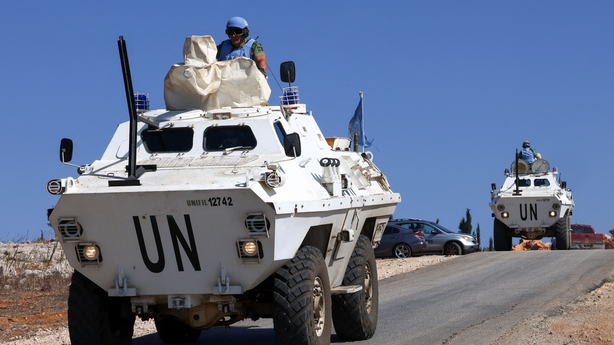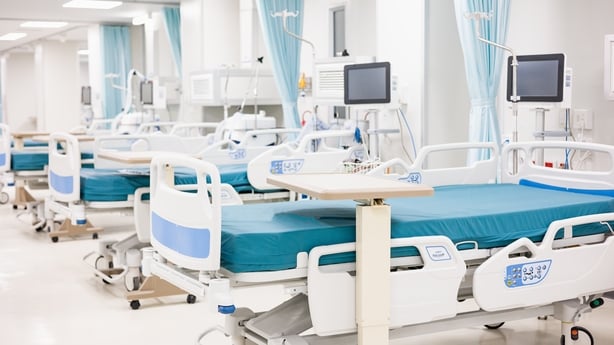The Cabinet has approved plans to strengthen knife crime legislation.
Minister for Justice Helen McEntee brought a memo to the Cabinet in relation to the issue this morning.
She said the planned new sentences would protect young people and reflect the seriousness of the crime.
The move has been welcomed by Taoiseach Simon Harris, who promised a swift response to law and order problems.
Under planned amendments, the maximum sentence for serious knife offences would increase from five to seven years.
The Cabinet also agreed to increase the penalty for importing knives and such weapons from seven to ten years.
Ms McEntee and her colleague Minister of State James Browne are also seeking more powers for gardaí to issue anti-social behaviour orders.
Speaking on RTÉ's Drivetime, Mr Browne said there was a lack of knife crime data in Ireland and the government was funding youth diversion projects in a bid to stop it.
McEntee updated colleagues on other measures her department is taking to tackle crime.
Legislation to give effect to these new sentencing terms will now have to go before the Oireachtas.
Speaking on RTÉ's Morning Ireland, Social Democrats TD Catherine Murphy said a multi-layer approach is needed to address the issue of knife crime and there should be a range of measures including community and youth work, along with penalties.
She said there are already tough deterrents in place, but said it has not addressed the problem adequately, adding that a knife amnesty in Scotland was very successful.
Ms Murphy said the number of knives seized are just a fraction of those that are carried.
The Labour Party has also welcomed the measures to tackle knife crime.

Defence
Meanwhile, Tánaiste and Minister for Foreign Affairs Micheál Martin sought Cabinet approval to increase the number of Irish peacekeepers serving at UNIFIL in Lebanon by 33.
He also requested that the mission be extended for another year from 30 May. The UN is expected to seek an extension of its own peacekeeping mandate in August.
The additional personnel is intended to enhance the overall security of the Irish battalion amid the heightened threat level in the region.
Their duties would include force protection, as well as increased convoy security.
The 123rd Infantry Battalion will conclude their six month deployment in May and will be replaced by the 124th infantry battalion in July, which would comprise the additional 33 personnel.
Health
Minister for Health Stephen Donnelly secured Government approval to draft legislative amendments, to allow pharmacists to prescribe in certain circumstances.
Mr Donnelly said the amendment will now be referred to the Office of the Attorney General for drafting.
"The amendment will be an important first step in introducing pharmacist prescribing and enhancing the contribution that pharmacists make to our health services," he said.
Currently, those that can prescribe are doctors, dentists and some nurses with additional training.
An "expert taskforce on pharmacy" is working on recommendations around the introduction of prescribing by pharmacists within their scope of practice.
In the meantime, the Department of Health wants to draft amendments to lay the legislative groundwork.
The intention is to have an agreed basis for pharmacists prescribing in place before the end of the year.

Separately, Mr Donnelly informed his Cabinet colleagues that there has been a 28% increase in critical care capacity during the lifetime of the Government.
It has increased from 258 ICU beds to 330. This has required approximately 770 additional staff.
Under the HSE's National Service Plan 2024, a further 22 beds are scheduled to be delivered, bringing the total number to 352.
The plan seeks to deliver 458 ICU beds by 2031.
Medical Cards
Minister for Education Norma Foley sought Cabinet approval for the Supports for Survivors of Residential Institutional Abuse Bill.
It seeks to provide an enhanced package of health supports and services to survivors of abuse in residential institutions.
This includes enhanced medical cards. Survivors living abroad will be able to avail of a payment of €3,000 in lieu of the enhanced medical care.
Survivors can also avail of grants to assist them in engaging in further or higher education.
Legislative programme
Government Chief Whip Hildegarde Naughton has published the summer legislation programme.
Overall, there are 29 bills for priority publication such as the access to cash bill, health information bill and residential tenancies bill, which will give tenants a right to first refusal when the property they are renting is put up for sale.
A total of 24 bills are scheduled for priority drafting.
Among them is the minimum sentence bill, which would give judges the power to set minimum sentences for murder and serious crime.
Finance meetings
Minister for Finance Michael McGrath and Minister for Public Expenditure Paschal Donohoe will travel to Washington DC for the spring meetings of the International Monetary Fund and World Bank.
Mr McGrath will meet with the IMF Managing Director, Kristalina Georgieva, and the President of the World Bank, Ajay Banga.






